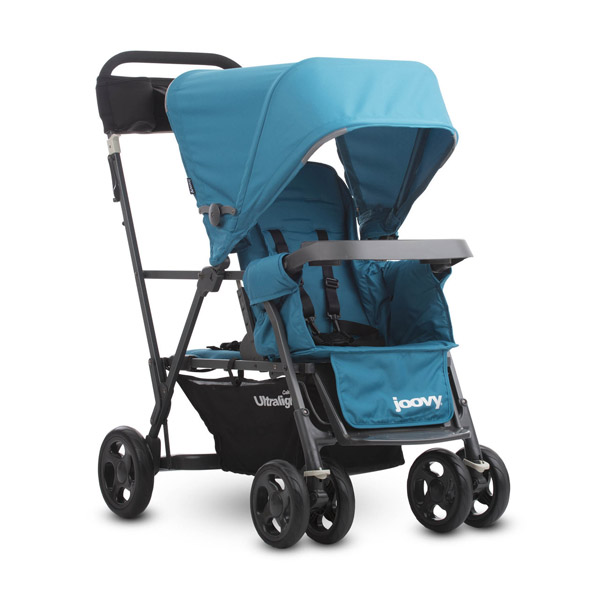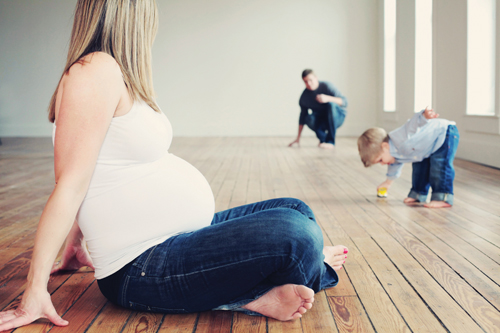I think I'll have another!

When I became pregnant with my second child, I felt […]
When I became pregnant with my second child, I felt confident I’d be an old pro at baby-baking. I knew what I was in for when it came to morning sickness (ahem, all day sickness). I was familiar with the trials and tribulations of each trimester. And I’d already survived the rite of passage that is labor and delivery once. Being pregnant a second time should have been a piece of cake. But it wasn’t.
Despite the wisdom and experience you have, subsequent pregnancies aren’t always the walk in the park you hope they might be. “Often, the pregnant-again mom is only seeing or expecting the parts of being pregnant that she already has experienced,” says Gloria Bachmann, MD, professor and interim chair of the department of OB/GYN reproductive sciences at Rutgers Robert Wood Johnson Medical School. And that can lead to some unwelcome surprises when things don’t go quite the same way the second time around.
So, what should you expect? Familiarize yourself with the most common symptoms of subsequent pregnancies, and learn how to manage them.

Your belly is going to look much bigger, much sooner. Although your second baby may not be larger than your firstborn—at birth, my second son was almost an entire pound lighter than my first—you will likely notice a much faster increase in belly size by the end of your first trimester.
Thankfully, this rapid growth generally levels off as you near the end of your pregnancy. As your body adjusts to the physical changes, however, you can expect more aches and pains, especially in your hips and joints. Minnesota-based midwives Sarah Biermeier, TM, CPM, and Erin Piorier, TM, CPM, recommend a combination of prenatal massage, yoga, reflexology and chiropractic care to reduce the inevitable discomfort.
You’re more tired
Tiredness is to be expected, but it tends to be worse during a second pregnancy. Dangling a 25-pound toddler from your hip while working and helping maintain a household might qualify you for Mom of the Year, but it is also bound to compound your exhaustion.
Women still experience the same fatigue-causing hormonal changes they did during their first pregnancy, but they are less likely to get enough sleep or eat balanced meals—both of which are crucial to improving energy. The best way to combat this? Get help!
“So many pregnant women take on all of the responsibility themselves,” says Bachmann. “Reach out for help! It is OK and normal to feel exhausted and anxious at times.” Biermeier and Piorier also recommend maintaining a healthy diet to fight fatigue, avoiding processed foods whenever possible and satisfying your sweet tooth with healthy treats, such as yogurt topped with fresh fruit and granola drizzled with honey.
Your labor may be shorter
Your body has been down this road before and knows what it’s doing, which means you’re likely to labor for a shorter period of time when you’re ready to give birth. A recent study showed that first-time moms average nine hours of active labor and an hour of pushing, while second-timers spend an average of six hours in active labor and a half-hour pushing. As Biermeier and Piorier point out, this does not guarantee an easy labor or delivery, but it’s nice to know that the least likeable part of having a baby may move along faster.
Your afterpains are stronger
Because your uterus has less muscle tone and elasticity, it will not return to its normal size as quickly as it did initially. This means the uterus is likely to clamp down more aggressively in an effort to stop the bleeding, which results in stronger postbirth pains.
To manage the discomfort, try placing a warmed rice sock or hot water bottle on your abdomen and keep your bladder empty. Light stretching and lower abdomen massage can also help. If needed, ask your healthcare provider about taking ibuprofen to ease the discomfort. Biermeier and Piorier also recommend rubbing essential oils (such as lavender and a drop or two of peppermint) on your abdomen, using cramp bark or drinking red raspberry leaf tea for natural pain management. Take comfort, too, in knowing the afterpains generally only last for up to three days postbirth.
Your baby weight lingers longer
Confession: I didn’t lose all of my baby weight after my first baby. Maybe you didn’t either. But regardless of whether you were at your ideal weight after baby No. 1, you’re likely to take a bit longer returning to your favorite digits on the scale following baby No. 2.
Between the tiredness, a new routine, your age and, for some of us, those remaining pounds from your first pregnancy, losing the weight tends to take a little more time. Cut yourself some slack. “Taking off baby weight is tough for all women, and there’s not a one-size-fits- all approach,” says Bachmann. Give your body at least six weeks to recuperate after delivery. Then, once you have been given the all clear from your healthcare provider, incorporate some light to moderate activity into your daily routine.
Most importantly, though, exercise patience. Remember that your body just did an amazing thing (again!). Be kind to yourself; you deserve twice the TLC this time around.







